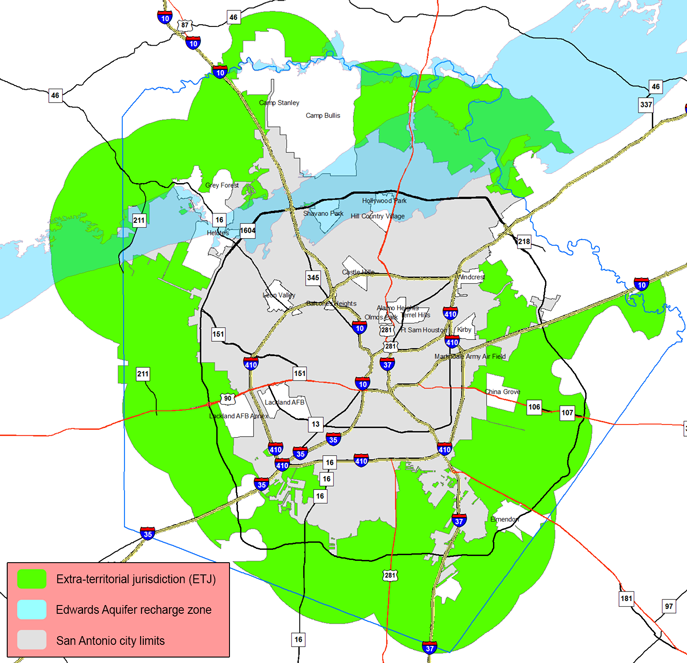May 4, 2023
A radical bill, backed by a coalition of land developers and builders, was finally passed and is headed to Greg Abbott’s desk for his signature. Before passage, it was amended to exempt San Antonio. Thanks to Camp Bullis and Golden-cheeked warblers, we dodged a cannon ball headed straight for our trees and aquifer.
No other city in Texas was spared. Land development LLCs and homebuilding corporations are soon to be substantially deregulated statewide.
What exactly does the bill do?
Senate Bill 2038 will allow landowners to unilaterally release their property from any Texas city's extra-territorial jurisdiction (ETJ). It would have nullified 410,000 acres of San Antonio's tree preservation ordinance and 46,000 acres of its aquifer protection ordinance.
All other city land development rules in the ETJ will be eliminated (except San Antonio's). Developers will no longer be required to construct major thoroughfares, provide sidewalks and bike lanes, set aside land for neighborhood parks and install landscaping.
What's at stake?
This bill will let developers clear-cut trees, even giant heritage oaks, anywhere in the ETJ. Since the vast majority of property inside San Antonio's (CoSA's) city limits is already developed, the ETJ is where nearly all development of raw, natural land occurs.
In addition, developers could have ignored the 15% impervious cover limit prescribed by the aquifer protection ordinance, as well as protections for creeks, caves and recharge features. There are approximately 46,000 acres of recharge zone in the ETJ (see map below).
The bill is unfair to taxpayers
The taxpayers of San Antonio have spent hundreds of millions of dollars buying 175,293 acres of land and conservation easements to protect the Edwards Aquifer. This bill would have given recharge zone developers, the polluters, a free ride by exempting them from aquifer protection rules.
Moreover, developers will be freed from paying for their proportion of major thoroughfare construction. This major expense will be shifted to taxpayers, or the thoroughfares won't get built.
Map of San Antonio's ETJ

The myth of "Regulation without Representation"
This bill is founded on the premise that, because residents in the ETJ cannot vote in city elections, they shouldn't be subject to city regulations. There are several flaws in this premise.
First, limited-liability corporations, and homebuilding corporations from places like California, Michigan and Dallas, can't vote in city elections anyway. The vast majority of ETJ residents have no city regulations to comply with. San Antonio’s tree and aquifer protection ordinances apply only to developers/builders.
Second, ETJ residents can't vote because they don't pay city taxes. Yet, they are free to take advantage of natural areas, city parks, streets and venues that city taxpayers paid for.
Third, there simply is not any "regulation without representation". ETJ residents are represented by their County Commissioners on ETJ regulations. Any city development codes applicable to the ETJ are authorized by "interlocal agreements" adopted by their County Commissioners Court (example: Comal County/CoSA agreement).